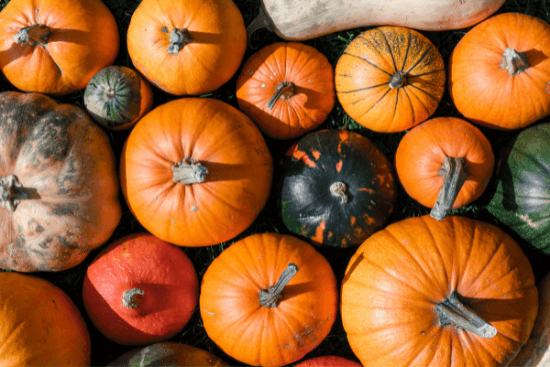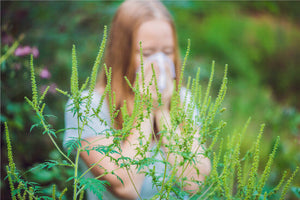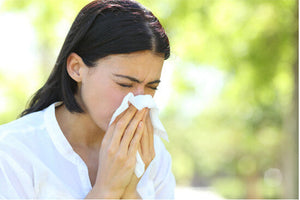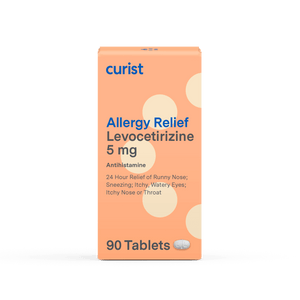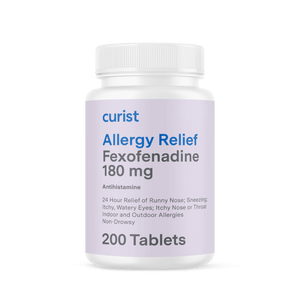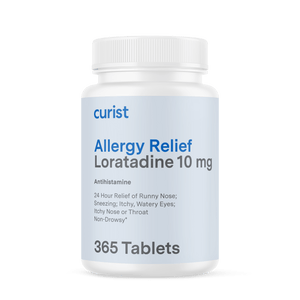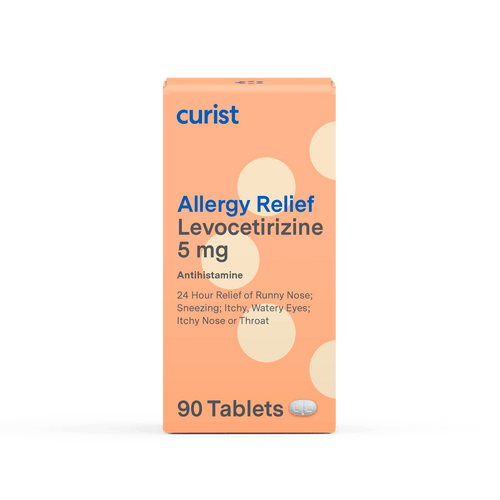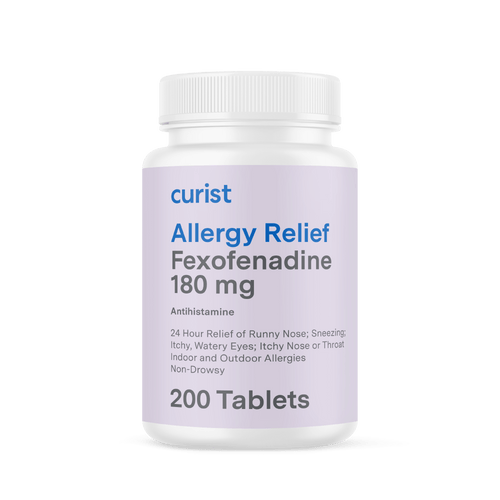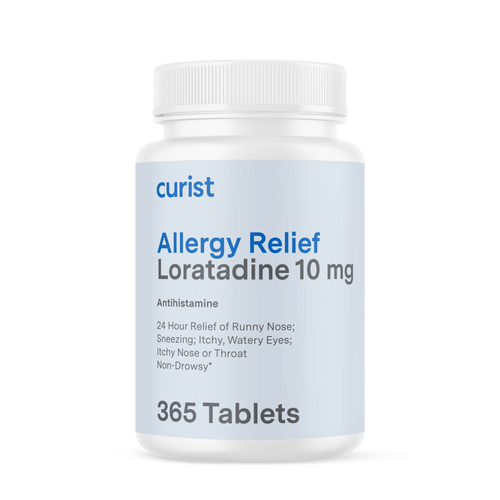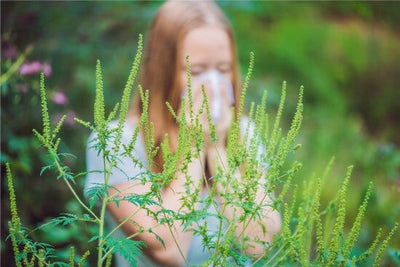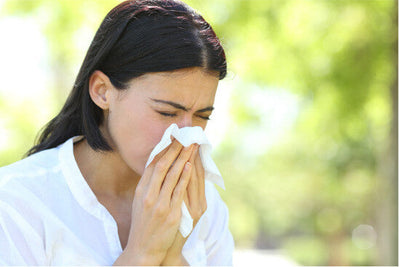By Allison Dinh, The University of Texas at Austin College of Pharmacy
Curist delivers over-the-counter medicines to your door at a fraction of the price of traditional brands. We hope everyone stays safe and healthy during this time.
Fall means many things: colorful leaves, back-to-school, and of course, pumpkins! This season brings forth a host of dishes that contain pumpkin; from lattes, pies, soups, and more. However, can people be allergic to pumpkins?
What is the Difference Food Allergies vs Food Intolerance?
Before we dive into pumpkins specifically, let’s discuss what food allergies and food intolerance are. Food allergies are the result of the body’s immune system reacting to food proteins—also known as allergens. These food proteins are harmless, but the allergy occurs because the immune system has become particularly sensitive to them.
On the other hand, food intolerance is not caused by the immune system and is less serious. Food intolerance can have a variety of causes such as irritable bowel syndrome (IBS), lacking an enzyme necessary for digesting a certain food, or stress. With food intolerance, it may be possible to eat small portions of the food without issue depending on your tolerance level.
Can I Have a Pumpkin Allergy? Why are People Allergic to Pumpkins?
Yes, you can be allergic to pumpkins! However, it is quite rare so most likely you don’t have to worry about saying goodbye to your pumpkin spice latte anytime soon. There have only been a few case reports of an allergic reaction to ingesting pumpkin flesh. In those instances, the allergic reactions involved a rash, throat tightness, and shortness of breath. Fortunately, these cases were resolved and the symptoms were not life-threatening.
It is unclear why some people are allergic to pumpkins in the first place. Some people may have a predisposition to this type of allergy if they are already allergic to gourds or melons. Several genetic and environmental factors are at play. However, according to the CDC, 90% of food allergies come from only eight foods (milk, eggs, fish, shellfish, wheat, tree nuts, peanuts, and soybeans) - none are pumpkin. By that statistic alone, one can see how gourd-related allergies pale in comparison. If you are concerned that you may have an allergy to pumpkins, please discuss with your healthcare provider.
Can You Be Food Intolerant to Pumpkins?
It’s certainly possible to be food intolerant to pumpkins! People can be intolerant to certain foods for a number of reasons. Symptoms of a pumpkin intolerance may include upset stomach, bloating, gas, or nausea. These symptoms of food intolerance to pumpkins are different from the symptoms of a food allergy to pumpkins, as they do not include an allergic reaction nor symptoms like itching or shortness of breath.
Can I be Allergic to Pumpkin Seeds? Can I be Allergic to Pumpkin Seed Oil?
Yes, you can be allergic to pumpkin seeds. There are very few reported cases of a pumpkin seed allergy, but in one reported instance, touching pumpkin seeds resulted in itchy eyes, watery eyes, and sneezing. Fortunately, like the allergy to pumpkin flesh, allergies to pumpkin seeds is also very uncommon.
Pumpkin seed oil is the oil extracted from pressing pumpkin seeds. Note that some products may say pepita oil instead, as pepitas are the seeds from a specific type of pumpkin. Pumpkin seed oil can be purchased as a cooking oil or as a supplement taken orally. Because pumpkin seed oil is just made from compressing pumpkin seeds, an allergy to pumpkin seeds would also include an allergy to pumpkin seed oil and the symptoms of an allergy to pumpkin seed oil would be similar to a pumpkin seed allergy.
What are Signs and Symptoms of a Pumpkin Allergy or Pumpkin Seed Allergy?
Allergic reactions to pumpkin or pumpkin seeds can be caused by either ingesting the pumpkin or seeds, or in some cases just touching the pumpkin flesh or seeds. As an allergy to pumpkin is just a form of food allergy, the symptoms of pumpkin allergies would be similar to other food allergy symptoms, like a food allergy to nuts. An allergic reaction may happen after eating or touching raw pumpkin or seeds, or even eating prepared products like pumpkin pie, pumpkin lattes, or pumpkin soup.
Some signs and symptoms that you might be allergic to pumpkin flesh or allergic to pumpkin seeds include:
- Shortness of breath
- Hives
- Throat tightness
- Throat itchiness (learn more here)
- Rash on skin that has come into contact with pumpkin or pumpkin seeds (learn more here)
- Itchiness (learn more here)
- Sneezing (learn more here)
- Nasal congestion
How Do You Know if You Are Allergic to Pumpkin or Allergic to Pumpkin Seeds?
The first way to tell whether you have a pumpkin allergy is to pay attention to your symptoms. For instance, if you ate food containing pumpkin and proceeded to experience allergy symptoms such as shortness of breath, hives, or itchy skin, that may be indicative of a pumpkin allergy. If you touched pumpkin seeds or spent time carving out a pumpkin and then developed a rash on your hands, that would point towards a pumpkin seed allergy. Further testing to determine if you have a pumpkin allergy can be done by an allergist.
Can I be Allergic to Other Gourds or Melons?
Pumpkins belong to a plant family called Cucurbitaceae which also encompass melons, squash, and other gourds. It is possible to be allergic to these other gourds as well, especially if one is already allergic to pumpkins in the first place.
Am I Allergic to My Pumpkin Spice Latte?
If you are allergic to pumpkins, yes you can be allergic to pumpkin spice lattes! While pumpkin spice itself does not contain pumpkin (it actually just includes cinnamon, nutmeg, ginger, and cloves), the pumpkin spice latte has pumpkin puree so someone with a pumpkin allergy should avoid pumpkin spice lattes. Even if you do not have an allergy to pumpkins, allergic reactions to pumpkin spice lattes could be possible if you are allergic to any of the other ingredients in pumpkin spice lattes, like milk or cinnamon.
Is Pumpkin a Common Allergy for Babies?
No, pumpkin is not a common allergy for babies. The most common culprits for food allergies in babies are the same ones as adults: milk, eggs, peanuts, tree nuts, fish, shellfish, soy, and wheat. Therefore, there is less of a chance that babies would be allergic to pumpkins compared to other food groups. As with all foods, pay close attention to how your baby feels after eating pumpkin for the first time. If they experience any signs of an allergy reaction, please seek medical care and discuss with your healthcare provider as it may be a sign of a pumpkin allergy.
How Can I Prevent Pumpkin Allergies?
Being proactive is key to preventing allergies in the first place. If you know you are allergic to pumpkins, avoid eating foods that contain them and do not touch their seeds. You should also exercise caution around pumpkins if you are allergic to melons, squashes, or gourds because cross-sensitivity is possible. If you have a history of food allergies, consider always having an Epi-Pen on hand at all times in case of an anaphylaxis reaction. Please discuss further with your allergy doctor.
How Do I Best Treat Pumpkin Allergies and Treat Pumpkin Seed Allergies?
In non-emergent situations, oral antihistamines can help relieve the rash and nasal allergy symptoms caused by pumpkin allergies or pumpkin seed allergies.
With several antihistamines on the market, it can be daunting to decide one is best for you. Typically, less drowsy antihistamines are a good option for allergy relief because you don’t have to worry about sleepiness getting in the way of your day. Less drowsy antihistamines include levocetirizine, loratadine, fexofenadine, and cetirizine. Antihistamines like Curist Allergy Relief (levocetirizine) are an effective option for treating allergy symptoms.
If you are having a severe allergic reaction, and especially if you have trouble breathing, please call 911 or seek urgent medical care immediately.
